|
|
|
| |

|
|
ICCAT Newsletter
November 2025
|
|
|
|
|
|
| |
|
Dear Readers and Tuna World Friends:
The past seven months have been a busy and a productive period for ICCAT. Thanks to close collaboration with all CPCs and partners, significant progress has been achieved across many areas during the intersessional period, yet important challenges remain. I am grateful for your valuable support in pursuing ICCAT’s objectives.
The measures adopted by the Commission entered into force on 16 June 2025, in line with ICCAT's tradition of its firm commitment to fulfilling its mandate.
The Commission’s subsidiary bodies met to advance their agendas. This has been particularly the case of the Virtual Working Group on a Sustainable Financial Position for ICCAT (VWG-SF), Panel 2, the Working Group on Integrated Monitoring Measures (IMM), the Standing Catch Document Scheme Working Group (CDS-WG), the Electronic Monitoring Systems Working Group (EMS WG), the Standing Working Group on Dialogue between Fisheries Scientists and Managers (SWGSM), and the SCRS. As in recent years, the Species Groups Meetings (22 to 27 September 2025) and the SCRS Plenary Session (29 September to 3 October 2025) were held in hybrid format in Madrid (Spain). In order to respond to the Commission's requests and issues, the Plenary considered, among other major subjects, the stock assessments of shortfin, white marlin, bigeye, the SCRS Science Strategic Plan, and reviewed its various research programmes, reaching positive conclusions.
The Commission will therefore consider all this intersessional work, along with other topics, at its 29th Regular Meeting in hybrid format at the Hotel Meliá Sevilla, Seville (Spain), from 17 to 24 November 2025. This session will be preceded by the Compliance Committee Meeting (15-16 November 2025), also in hybrid format.
Convinced that the synergies we have built will continue to guide our daily work, helping us respond effectively to emerging issues and priorities, the Secretariat remains fully committed to working hand in hand with all stakeholders to advance our shared objectives and ensure the conservation and management of Atlantic tunas and tuna-like species.
Let's keep moving forward together!
See you soon in Seville!
Happy reading!
|

Executive Secretary
|
 |
|
|
|
|
| |
|
|
ICCAT Participation and/or organization to Workshops, Seminars and Courses
|
|
 |
Between March 2025 and October 2025, members of the ICCAT Secretariat staff have participated actively in meetings and activities related to ICCAT:
| Mar |
Fifth meeting of the PSMA Open-Ended Technical Working Group on Information Exchange
Paris, France, 10-14 March 2025
|
|
| Apr |
20th anniversary European Fisheries Control Agency (EFCA)
Vigo, 24 April 2025
Balfegó Event
Tarragona, 22 April 2025 |
|
| May |
Joint conference of ASFA-FAO, EURASLIC and GreyNet International
Pisa, Italy 7 May 2025
ICSP-18
New York, USA, 14-16 May 2025
Capacity building 2025 for Senegal Tuna-ABNJ2 Project under FAO Common Ocean Programme
Diamniadio Dakar, Sénégal, 19-21 May 2025 |
|
| Jun |
2025 United Nations Ocean Conference
Nice, France, 9-13 June 2025
Tuna Compliance Network (TCN)
Tokyo, 9-14 June 2025 |
|
| Jul |
14 Session of the FAO/FIRMS Steering Committee and the 28th session of the FAO/CWP (ICES headquarters,
Copenhagen 30 June to 4 July 2025
Twentieth session of the Western Central Atlantic Fishery Commission (FI-739-20)
Montego Bay, Jamaica, 8 July 2025
ABNJ Tuna Common Oceans Steering Committee Meeting
FAO Headquarters, Rome, Italy, 15–17 July 2025 |
|
| Aug |
BBNJ Agreement Preparatory Commission – Second session
New York 18-29 August 2025 |
|
| Sep |
Regional Coordination Meeting (RCM) on the Agreement on Port State Measures (PSMA) and Complementary instruments - European Region
Bergen, Norway, 1-5 September 2025 |
|
|
Recent Meetings that have taken Place
2025 Commission meetings
 |
|
Mar
Intersessional Meeting of Panel 2
Hybrid, Madrid, Spain, 4-6 Mar
May
Second Meeting of the Virtual Working Group on Sustainable Financial Position for ICCAT (VWG-SF)
Online, 22 May
Jun
Electronic Monitoring Systems Working Group Meeting (EMS WG)
Hybrid, Brussels, Belgium, 17-20 Jun
Second Standing Catch Document Scheme Working Group (CDS WG)
Hybrid, Brussels, Belgium, 17-20 Jun
18th Meeting of the Working Group on Integrated Monitoring Measures (IMM)
Hybrid, Brussels, Belgium, 17-20 Jun
Oct
Intersessional Meeting of Panel 1 on Tropical Tunas MSE
Online, 8 Oct
|
|
2025 SCRS meetings
 |
| |
Mar
Shortfin Mako Shark Data Preparatory Meeting
Hybrid, Malaga, Spain, 10-14 Mar
White Marlin Data Preparatory Meeting
Hybrid, Madrid, Spain, 24-28 Mar
Apr
Intersessional Meeting of the Bluefin Tuna Species Group
Hybrid, Sète, France, 8-11 Apr
Bigeye Tuna Data Preparatory Meeting
Hybrid, Pasaia, Spain, 21-25 Apr
May
Subcommittee on Ecosystems and Bycatch Intersessional Meeting
Hybrid, Madrid, Spain, 12-16 May
Intersessional Meeting of the Small Tunas Species Group
Hybrid, Olhão, Portugal, 26-28 May
Jun
Shortfin Mako Shark Stock Assessment Meeting
Hybrid, Madrid, Spain, 9-13 Jun
White Marlin Stock Assessment Meeting
Hybrid, Madrid, Spain, 23-27 Jun
Jul
SCRS Science Strategic Plan Meeting
Hybrid, Madrid, Spain, 9-11 Jul
Bigeye Tuna Stock Assessment Meeting
Hybrid, Madrid, Spain, 14-18 Jul
Sep
Species Groups and Subcommittee on Statistics (SC-STATS) Meetings
Hybrid, Madrid, Spain, 22-27 Sept
Sep / Oct
SCRS Plenary Meeting
Hybrid, Madrid, Spain, 29 Sept – 3 Oct
|
|
2025 Commission/SCRS
Seminars & Workshops
| |
Online training workshop sessions on using ICCAT's Integrated Online Management System (IOMS)
6 May and 30 Jun
First ICCAT: WECAFC Technical Workshop
Panama City, Panama, 7 and 8 May 2025
Technical Capacity-building workshop on small tuna ageing
Hybrid, Olhão, Portugal, 29-31 May
Second ICCAT workshop on the use of the bycatch estimation tool (BYET)
Panama City, Panama, 21-23 Jul
3rd Workshop on collaborative work to assess the bycatch of marine turtles in ICCAT fisheries in the Mediterranean Sea
in-person only, Olhão, Portugal, 6-10 Oct
|
|
2025 Calendar for remaining events
|
Additional information on these meetings is available on the ICCAT website.
|
|
|
|
| |
| |
| |
|
|
| |
ICCAT Data Collection and Research programmes |
|
| |
GBYP
Phase 14 started in February 2024, running for 23 months. Following budget adjustments, the Secretariat requested an amendment to the EU Grant Agreement in July 2025 to adapt activities and funding.
Highlights from September 2024 – August 2025:
- Data Systems: Strengthened information systems at the ICCAT Secretariat to better manage biological and electronic tagging data.
- Aerial Surveys: 2024 survey results improved stock abundance indices; updates were made for the Balearic Sea, and a new Western Mediterranean survey was completed in June 2025.
- Tagging: Over 140 tags deployed through new partnerships, supporting electronic pop-up and internal archival tagging, as well as acoustic tagging. In 2025 (until 15 October) a total of 29 pop-up, 4 internal archival and 10 acoustic tags have been recovered. Most campaigns were very successful, including tracking of a bluefin tuna that showed a one-year journey without leaving the Eastern Mediterranean Sea.
 |
TUNIPEX staff isolating a shoal of bluefin tuna specimens at a tuna trap off Southern Portugal, during an ICCAT acoustic tagging campaign (Source: ICCAT).
|
- Biological Studies: Genetic research advanced, which improved our understanding of population structure, mixing, and interbreeding. Nearly 4,000 new larvae samples were added to the Tissue Bank, which is being expanded and digitized.
- Modelling: Two new contracts were launched to test the impact of new genetic and survey data on management strategy evaluations (MSE).
These activities are critical to refining stock assessments and strengthening science-based management of Atlantic bluefin tuna..
Additional information can be found here. |
|
ALBYP
Significant progress has been made regarding biology, movement, and management strategy evaluations.
Reproduction:
- North Atlantic: 649 gonad samples and 460 spine samples (2019–2025) showed all maturity stages, with peak spawning April–September between 15°–25°N. Size and age at first maturity seems to be lower than previous estimates (females: 72.6 cm/3.8 years; males: 80 cm/4.7 years).
- South Atlantic: 441 histological samples confirmed spawning in the tropical SW Atlantic during spring–summer. Size at maturity was ~95 cm, with rapid growth in the first two years.
Movements & Habitat Use:
- North Atlantic: 33 MiniPATs and 225 internal archival tags deployed; 50 tag recoveries produced >9,000 tracking days. For the first time, albacore were tracked for over a year, revealing seasonal migrations and unexpected winter residency in the Bay of Biscay.
- South Atlantic: New MiniPAT deployments planned for late 2025–early 2026.
 |
AZTI (EU-Spain) staff deploying Lotek internal archival tags (on the right panel) off the Bay of Biscay, within the ICCAT Atlantic Albacore Tuna Tagging Program (Source: AZTI)
|
Management Strategy Evaluation (MSE):
- Contractors developed new Operating Models and Observation Error Models, refining the framework for future stock management.
- These updates ensure continued testing of the Management Procedure (MP) adopted in 2021 and alignment with ICCAT’s harvest control objectives.
Additional information can be found here.
|
|
SMTYP
Since 2018, this programme has coordinated biological sampling of small tunas — little tunny (LTA), Atlantic bonito (BON), and wahoo (WAH), among others. Initial contracts (2018–2023) engaged a consortium of 12 institutions from 11 CPCs, followed by new agreements in 2024–2025 involving 13 entities from 10 CPCs.
Objectives:
- Fill size gaps for growth and maturity estimates.
- Determine growth and reproduction parameters for BON, LTA, WAH, frigate tuna (FRI), and bullet tuna (BLT).
- Refine stock structure analyses for these species.
- Investigate genetic differentiation between FRI and BLT.
Results and updates have been presented during intersessional meetings. Priorities for 2026–2029 include:
- Updating the biological meta-database.
- Estimating length–weight relationships at stock/regional levels.
- Calibrating and adopting common maturity scales.
- Developing data-limited methods for management advice.
Additional information can be found here.
|
|
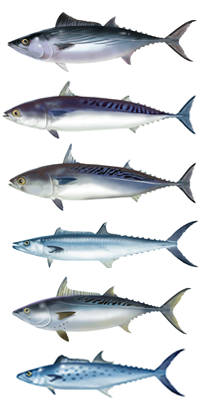
|
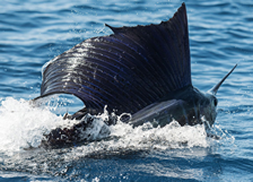
|
|
EPBR
This programme continued in 2025 under the coordination of Dr. Rui Coelho (EU-Portugal, East Atlantic) and Ms. Karina Ramírez López (Mexico, West Atlantic). Originally designed to collect catch/effort data and support tagging and ageing studies, the programme has since expanded to include habitat use, spawning, and genetics research.
Key highlights:
- Sample collection: Since 2019, 735 biological samples of BUM, WHM, and SAI have been collected in the Eastern Atlantic, by teams from West Africa and Portugal, focusing on age and growth studies. A bomb-radiocarbon validation study for blue marlin otoliths began in 2025.
- Reproduction studies: Ongoing research in the Gulf of Mexico (led by Mexico) is investigating blue marlin reproduction.
- Tagging: Since 2023, satellite and conventional tagging has been carried out in the eastern Atlantic, with 11 white marlins and 2 blue marlins tagged with pop-up tags, plus 31 conventional tags deployed on white marlines. Early satellite tag performance was limited, but improved devices are in use in 2025. Expansion to other Atlantic regions is planned for 2026, pending funding.
EPBR activities are now financed through ICCAT’s general science envelope and supported by the U.S. Data Fund.
Additional information can be found here .
|
|
SRDCP
The Shark Species Group (SSG) advanced several key studies in 2025:
- Age & Growth: A collaborative study on South Atlantic shortfin mako confirmed a new ageing method, now applied to both Atlantic stocks. Age and growth research also progressed for longfin mako, oceanic whitetip, and silky shark, with vertebrae sampling and collection of images underway.
 |
Shark vertebra cut used for age readings (left). Distribution of samples by species and fleet used on the ICCAT collaborative study on shark aging (right) (Source: IPMA, Portugal).
|
- Genetics: Porbeagle studies confirmed two sibling species (North Atlantic vs. Southern Hemisphere), but no differentiation within each hemisphere. New genome-wide analyses of 106 juveniles revealed kinship links, offering insights into connectivity.
- Tagging & Movements:
- Shortfin mako: Updated post-release mortality analysis (29.4%) from 128 tags; 52 satellite tags deployed, including in the SW Indian Ocean.
- Porbeagle: 9 electronic tags deployed in the North Atlantic, showing migrations up to 5,000 km; joint regional analyses planned.
- Other sharks: 86 tags deployed across silky, oceanic whitetip, hammerheads, blue shark, bigeye thresher, and longfin mako, with new campaigns in 2024/2025. Additional tagging of blue sharks began in 2025 to study connectivity between the Mediterranean and NE Atlantic.
- Reproduction: A hormone-based study on North Atlantic shortfin mako confirmed the potential of muscle tissue for reproductive assessments. A campaign to collect gravid female samples has been rescheduled for October 2025.
These efforts are refining knowledge on shark biology, stock boundaries, habitat use, and mortality, directly supporting more robust conservation and management measures.
Additional information can be found here.
|
SWOYP
Progress 2018–2025
Launched in 2018, the SWOYP brings together 23 institutions from 15 CPCs to reduce key uncertainties in swordfish biology and improve stock assessments. The programme focuses on ageing and growth, reproductive biology, genetics, and tagging, with over 4,700 swordfish samples collected across all three ICCAT-managed stocks.
Key Highlights:
- Age & Growth: 3,582 fin spines, 1,392 otoliths, and 783 gonads analysed; new protocols developed; bomb radiocarbon validation underway; preliminary estimates support maximum ages of 10–12 years.
- Reproduction: 3,185 individuals staged for maturity, including 776 through histology; further sampling needed in spawning hotspots such as the Sargasso Sea and Gulf of Guinea.
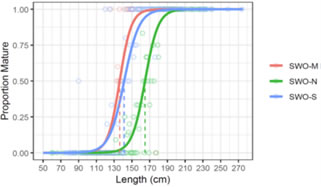 |
Preliminary results swordfish sexual maturity (sex combined) for the North Atlantic (SWO-N), South Atlantic (SWO-S) and Mediterranean (SWO-M) stocks (Borrego-Santos et al., 2025).
|
- Genetics: Genome sequenced; SNPs identified for stock differentiation; epigenetic ageing shows promise with 57 CpG sites identified as age predictors.
- Tagging: 54 satellite tags deployed since 2018 across the Atlantic and Mediterranean; recent campaigns in the NE Atlantic and off Newfoundland have expanded knowledge of migration, stock mixing, and vertical habitat use.
Looking Ahead:
From 2026, work will continue with further ageing calibration, gonad histology, genetic analyses, and targeted tagging to fill geographic and size-class sampling gaps. These efforts are essential to refine growth, reproduction, and movement models, ultimately strengthening management advice for swordfish stocks.
Additional information can be found here.
|
TTRaD
This programme, which was launched in 2024, supports ICCAT tropical tuna management through data collection, tagging, age and growth studies, and Management Strategy Evaluation (MSE) developments. In 2025, TTRaD focused on improving scientific advice, updating spatio-temporal models, and maintaining the Atlantic Ocean Tropical Tuna Tagging Programme (AOTTP) database.
Key Achievements:
- MSE & Stock Assessment: Western skipjack models reconditioned with updated data, including climate change robustness scenarios; multi-stock MSEs advanced using hybrid harvest control rules to simulate TAC and fleet effort adjustments.
- Age & Growth Studies: Extensive specimen collection in the Gulf of Guinea and Central/Southern Atlantic; processing of otoliths, spines, and vertebrae is nearly complete, with preliminary age data already presented.
- Mortality Estimates: Using conventional tagging data, preliminary estimates of total (Z), natural (M), and fishing (F) mortality were made; uncertainties and reporting biases are being addressed for integration into stock assessments.
- Spatio-Temporal Modelling: The agent-based POSEIDON-EAO model tested fleet behaviour, FAD use, and management measures; results suggest moderate FAD limits could reduce juvenile bigeye risk while maintaining catch levels.
These activities enhance understanding of tropical tuna stocks, informing robust management measures and decision-making for ICCAT.
Additional information can be found here. |
|
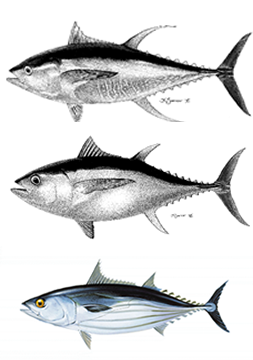
|
|
|
|
|
| |
Voluntary contributions

As part of the new ICCAT/Japan Capacity-building Assistance Project (JCAP-3), several training programmes and capacity-building activities were carried out in early and mid-2025 to strengthen national capacities in fisheries monitoring, species identification, data collection, and scientific research.
- Ghana – A training course (Tema, 16–18 January) was held for onboard fisheries observers to improve skills in taxonomy, sampling design, and reporting, enabling consistent submission of Task 1 and 2 datasets to ICCAT. In addition, Ghana received JCAP-3 support to update databases, software, and hardware to restore robust fisheries data submissions.
- São Tomé e Príncipe – Two training initiatives (São Tomé, 20–25 January) focused on species identification (tunas, sharks, billfishes, turtles), data collection, and electronic tagging. Local scientists were engaged in swordfish and shark tagging programmes, as requested by the SCRS.
- Gabon – Capacity-building workshops for fisheries departments in Port-Gentil and Mayumba were rescheduled for October 2025, due to the political situation earlier in the year. These will support artisanal fisheries data collection, species identification, and reporting.
- Egypt – A national training programme (Alexandria, 18–29 May) enhanced fisheries observers’ technical capacity in data collection and ICCAT reporting, aiming at long-term, replicable training models.
- Nigeria – A four-day training workshop (Lagos, 21–24 July) strengthened fisheries officers’ and fishers’ skills in tuna stock monitoring, species identification, and sustainable fishing practices, with a community-level training cascade approach.
- Guinea – Two workshops were organized to improve knowledge of tuna species exploited by artisanal and industrial fleets, and to support implementation of ICCAT Recommendations. Skipjack samples were also collected for the Tropical Tuna Research and Data Collection Programme (TTRaD).
- Senegal – Through JCAP-3 support, Dr. Kamarel Ba (CRODT) undertook a three-month fellowship at the Institute of Marine Research, Norway, focusing on advanced data analysis, abundance index standardization, and species distribution modelling of skipjack tuna.
|
These initiatives highlight ICCAT’s continued commitment to strengthening scientific and technical capacities across CPCs, ensuring more accurate data reporting, enhanced monitoring, and greater participation in fisheries management and conservation.
Since the last Newsletter (March 2025) the ICCAT Secretariat has received the following voluntary contributions:
The United States provided US$160,000 support to cover science activities for fiscal years 2026-2027. These include US$100,000 for ICCAT’s EPBR, to continue: age validation through bomb radiocarbon, within the scope of the growth study of the three priority billfish species in the eastern Atlantic (blue marlin, white marlin, sailfish); and the electronic tagging of the three priority billfishes. In addition, US$60,000 will support further development of the Bycatch Estimation Tool, serving to simplify the tool itself through continued development and to hold a new user’s workshop in 2026.
In October 2025, the People Republic of China made a voluntary financial contribution to their Special Data Fund in the amount of €9,000. China also informed that they would destine €80,000.00 de of this fund to scientific activities for 2026-2027 related to tropical tunas.
Currently, the Secretariat are discussing with Canada and the European Union further voluntary contributions to support science activities in the next two years in ICCAT.
ICCAT has five active grant agreements with the European Union, which include the following:
- Strengthening the scientific basis on tuna and tuna-like species for decision-making in ICCAT. The voluntary contribution of the European Union amounts to (€800,000) (contract amount €1,000,000, in support of science in ICCAT during 2024-2025.
- Atlantic-Wide Research Programme for the Bluefin Tuna, Phase 14. The voluntary contribution of the European Union amounts to €800,000, whilst the remaining €900,000 are contributed voluntarily by other ICCAT CPCs that have a bluefin tuna quota, as well as the GBYP fund (balance) (contract amount €1,700,000), in support of bluefin tuna science activities in 2024-2025.
- Integrated Online Management System (IOMS). The voluntary contribution of the European Union amounts to (€150,000.00); (contract amount €188,187.32) in support of the development of the IOMS.
- Integration of the UN/FLUX standard into the IOMS. The voluntary contribution of the European Union amounts to €100,000.00; (contract amount €125,321.26) in support of this specific component of the IOMS.
- ICCAT - contribution to the organisation of ICCAT intersessional meetings and other working and technical groups (2025/2026). The voluntary contribution of the European Union amounts to €240,000.00 (contract amount €312,500.01).Pilot project on the implementation of Remote Electronic Monitoring on bluefin tuna processing vessels. The voluntary contribution of the European Union amounts to €164,604.80 (€209.506,00) .
|
Following the agreement signed with the FAO ABNJ2 Tuna Project within the framework of the Common Oceans Tuna Project of FAO, and the third voluntary contribution received (€115,056), the ongoing activities include: i) improve compliance with ICCAT conservation and management measures, particularly through strengthening port inspection capacity; ii) support centralized online data management for reporting, validation, storage, and access; iii) generate ecosystem-based operating models for testing ecosystem indicators and management policies; iv) coordinate on common challenges and to communicate key messages on progress in fisheries management, particularly in the context of ongoing BBNJ discussions and the UN Fish Stocks Agreement review process.
|
|
|
|
|
| |
|
| |
Other News
|
|
| |

|
29 th Regular Meeting of the Commission
The International Commission for the Conservation of Atlantic Tunas (ICCAT) will meet in Seville (Spain) at the 29th Regular Meeting of the Commission to take important decisions on the conservation and management of ICCAT fisheries. |
|
|
|
Publications
All Volumes of the 2025 Biennial Report (Part I, Volumes 1 to 4) have been published, including Volume 4 that contains the reports issued by the Secretariat for the SCRS and the Commission.
To date the first seven issues of Volume 82 of the ICCAT Collective Volume of Scientific Papers, have been published, including 220 scientific papers and reports presented to the SCRS during 2025. The Secretariat has prepared a proposal for new Guidelines for authors of scientific papers for the ICCAT SCRS and Collective Volume Series, aiming to facilitate reading by placing tables and figures within the text as usually done on periodic journals. |
|

|
|
|
|
|
|
| |
|
|
| |
Staff News
|
|
| |
|
|
| |
Mr. M’Hhamed Idrissi, the former Compliance Officer, retired in September 2025. Throughout his tenure, Mr. Idrissi made significant contributions to the work of ICCAT, strengthening the Commission’s compliance framework and supporting its objectives with dedication and professionalism. The ICCAT community extends its sincere appreciation for his many years of service and wishes him the very best in his retirement and future endeavours. |
|
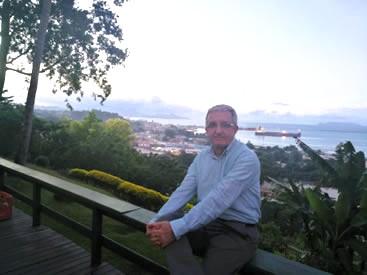 |
|
|
| |
|
|
| |
|
|
| |
|
|
 |
Mr. Ousainou Jaiteh joined ICCAT as Software Developer in June 2025. |
|
| Mr. Jose Antonio Acuña joined as Compliance Officer in July 2025 following the retirement of Mr. M’Hamed Idrissi in September 2025. |
 |
|
|
|
|
The ICCAT Secretariat would like to wish all these new members a warm welcome and great success in their new careers as staff member of ICCAT. |
|
| |
|
|
|
|
|
|
For further news on ICCAT activities, please visit our website: ICCAT·CICTA·CICAA.
Should you detect any errors or wish to provide any suggestions for improvement in this Newsletter, please inform us by e-mail. |
|
|
|
|
|
 |
© 2025. ICCAT Newsletter. |
|
| |
| |
|
|
|



















